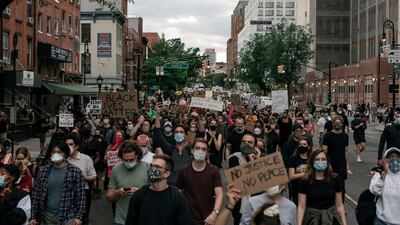Anti-racism protests that have swept the United States risk further spreading Covid-19 in US cities, the White House coronavirus co-ordinator, Deborah Birx, has said.
“I do worry, I worry terribly about the peaceful protests,” Dr Birx said in a discussion hosted by the German Marshall Fund’s Brussels Forum.
“We are really trying to work with each of the mayors to expand testing availability over the next week or two so that the people who are involved in the peaceful protests can get tested and really know their status before they unknowingly spread it,” she added.
Demonstrations in major American cities, many marred by rioting and police violence, began after the death of George Floyd, a 48-year-old black man, in police custody on May 25.
The outpouring of public anger over Floyd’s death has also coincided with the coronavirus outbreak, which has claimed more than 100,000 lives in the US.
Dr Birx, who has served as a White House public health adviser to both President Donald Trump and his predecessor, Barack Obama, said a variety of factors had aligned leading to a higher mortality rate from Covid-19 among the country’s black and minority ethnic populations.
According to the US Centres for Disease Control and Prevention (CDC), figures suggest African Americans are disproportionately affected by the virus.
In a study of data compiled from hospitals in 14 US states, African Americans represented 33 per cent of coronavirus hospitalisations, despite making up only 18 per cent of the total population studied.
The White House Covid-19 co-ordinator said minority communities’ tendency to live in densely populated cities had contributed to these trends alongside patterns for co-morbidities.
For example, health conditions such as obesity, diabetes and asthma exist at higher rates in the black community, thereby making African Americans more susceptible to the virus.
They also are more likely to lack health insurance, and often report that medical professionals take their ailments less seriously when they seek treatment.
Dr Birx said ethnic minorities had also been more exposed to the pandemic in essential jobs.
“They are the ones that kept food on our tables, they are the ones that drove the trucks. They are the ones that did the deliveries. They are the ones that went to the hospitals and went to really care for those of us who needed us the most,” she said.
“There was a large segment of the American population still working and a lot of that was in our African-American communities. So uniquely they were working more in those essential jobs.”

